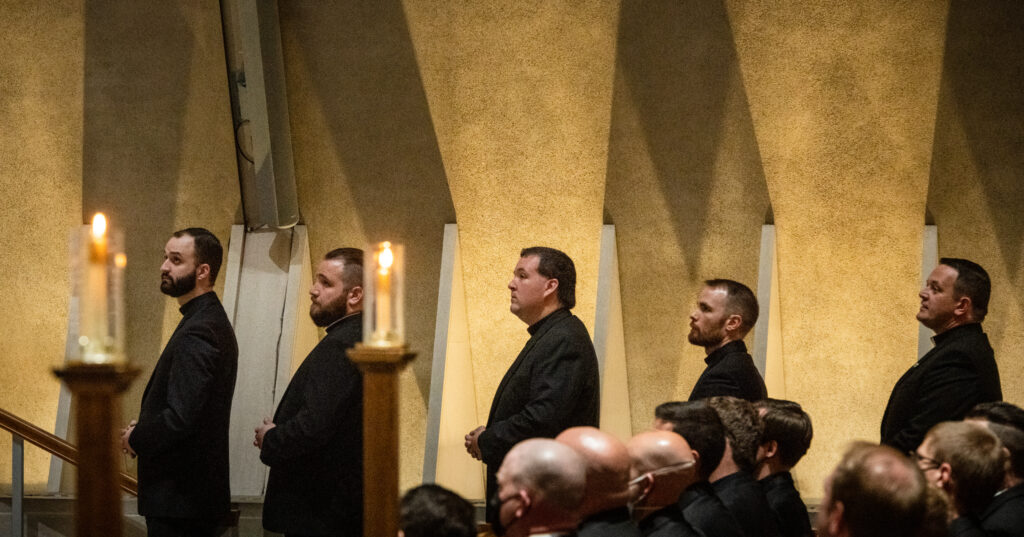By James Baneck
This past April, I spent several days in the hospital battling COVID-19. I received maximum oxygen and numerous medications and was almost put on a ventilator. During this time, I was in isolation — not even my wife could visit.
When family and friends learned of this situation, they sent dozens of texts. These dear Christians sent Scripture readings of comfort and hope. When I received them, I read them more than once, breathing in the Word of God and resting in Christ.
During my second week in the hospital, my pastor visited me. I have provided pastoral care to many during my years of ministry, but I realized that being on the receiving end of pastoral care is such a gift. As I lay in my hospital bed with a breathing mask, my pastor read Holy Scripture and gave me the Sacrament of our Lord’s body and blood. When I received the body of Christ, it was like medicine on my tongue. The blood of Christ surged into my body with forgiveness, hope and eternal life. Psalm 34 flooded my mind: “Oh, taste and see that the Lord is good! Blessed is the man who takes refuge in him” (Psalm 34:8). This is the effect of the Word every time it is proclaimed and applied to our human condition and received in faith.
Consider this: How did my family, friends and pastor know what Scripture to send and read? How did they know which Scripture was appropriate and applicable? How did they interpret the Scripture to know this specific passage would speak to my specific need? If we are all born blind, dead and enemies of God, as Scripture teaches, then they would have no original knowledge, understanding or awe of the Scripture.
The ministry of teaching and administering
Article IV (Justification) of the Augsburg Confession (AC), one of our key Lutheran confessional statements, reads:
Our churches teach that people cannot be justified before God by their own strength, merits, or works. People are freely justified for Christ’s sake, through faith, when they believe that they are received into favor and that their sins are forgiven for Christ’s sake. By His death, Christ made satisfaction for our sins. God counts this faith for righteousness in His sight.
Article V (The Ministry) next upholds the importance and necessity of the pastoral office; this article intentionally follows the article on justification:
So that we may obtain this faith, the ministry of teaching the Gospel and administering the Sacraments was instituted. Through the Word and Sacraments, as through instruments, the Holy Spirit is given. He works faith, when and where it pleases God, in those who hear the good news that God justifies those who believe that they are received into grace for Christ’s sake. This happens not through our own merits, but for Christ’s sake.
The point is this: The Office of the Pastoral Ministry is foundational in the faith and life of God’s people. Through this office — through the voice and ministry of the pastor on behalf of Christ — the Holy Spirit works saving faith in His people through the preached Word and the Holy Sacraments. The pastor serves as the steward of this Word and these Sacraments. He is formed, called and ordained into this Christly office to impart this saving faith through preaching, teaching, feeding the Lord’s Supper, baptizing and serving God’s people with faithful pastoral care. Christians need pastors, and our Lord supplies them through His church for the saving faith of His people.
The pastor teaches God’s Word to God’s people. Through the ministry of the pastor, God forms His people in the Word to understand it, believe it and live it, including parents, commissioned church workers and pious laypersons.
This is also the answer to the question I asked above: Because of the service of many faithful pastors, my family, friends and pastor were able to send me Scripture and console me in God’s Word. They had been taught what the Scriptures meant. They grew to understand its power. They believed its effectiveness on the soul and body since they had been disciples of the Word at the feet of their pastor throughout months and years of faith formation. The Office of the Holy Ministry is absolutely necessary for our faith and life. This is God’s good and gracious will for His church and our salvation. And to be perfectly clear, the pastoral ministry is always to proclaim Christ crucified and risen from the dead. Therefore, The Lutheran Church—Missouri Synod (LCMS) will continue to form, call and ordain them.
Church Worker Recruitment Initiative
Since its 67th Regular Convention in 2019, the LCMS has embarked on an aggressive, comprehensive Church Worker Recruitment Initiative (CWRI). This initiative is not about recruiting bodies to fill the various offices of the church, nor is it just an attempt to reverse a decline in church workers. Rather, the initiative seeks to form pastors and church workers to hand over the saving faith to God’s people, passing on the Christian faith from one generation to the next until our Savior’s return.
While the pastoral office is foundational in the life of the church, the focus of CWRI extends beyond the pastoral office. The LCMS uses several key auxiliary vocations in the church to assist the pastor in nurturing the faith in the lives and eternal souls of God’s people. The Lutheran Service Book: Agenda states, “This [auxiliary] office has been established in love by the Church to support the Office of the Holy Ministry and to assist the faithful in their God-given vocations.”[1] These vocations include Lutheran teachers, directors of Christian education, directors of Christian outreach, directors of family life ministries, directors of parish music, deaconesses, parish assistants and certified lay ministers.
These church worker vocations are joyful offices of integrity and fulfillment. These vocations, grounded in Christ and baptismal salvation, are honored and respected throughout the church because they assist in serving Christ’s church. Our commissioned workers are dedicated, loyal, faithful and honorable servants in the church.
Forming church workers
Our church workers are formed and shaped for their service in the church through in-depth development and continuing education, including spiritual, character, confessional, physical, emotional, synodical and intellectual development. Because of their baptismal identity in Christ and the high regard they have for their vocation, our workers continually strive to excel in their service in the Gospel to the people whom they serve. Our church workers are excellent in what they do, and they are our church’s primary influencers in identifying, catechizing, encouraging and supporting young boys and girls for church-work vocations.
This beautiful, perpetual cycle in the life of the church begins with faithful pastors teaching, preaching and providing pastoral care with and through the Word of God. This teaching and preaching forms and grows Christians in the church, including other church workers, parents and laity. Through biblical formation and the care and support of the congregation and key influencers, God raises up those who will serve in the church in the next generations. Through the Christian nurture of pastors, grandparents, church members, Lutheran schoolteachers, directors of Christian education and youth workers, directors of evangelism, deaconesses and others, God forms and shapes servants for His church.
As a Synod, we have developed a comprehensive system in forming our church workers. We have established a Lutheran school system with 1,741 preschools (63,483 students), 828 elementary schools (62,989 students in K–8), 97 high schools (16,124 students), three international schools, seven colleges and universities (978 students in church-work programs), and two seminaries (443 ordination-track students).
Declining numbers
While we rejoice in these numbers, in the last 14 years, the LCMS has experienced a 59% decrease in our pre-seminary Concordia University enrollment, a 61% decrease in Lutheran teaching programs, a 56% decrease in our director of Christian education programs, a 43% decrease in the deaconess program, a 47% decrease in director of parish music programs and a 65% decrease in director of family life programs. In our seminaries, the Synod has experienced a combined decrease of 55% of those enrolled in the Master of Divinity degree over the last 14 years.
Yet, we are not driven by fear but hope. We raise up workers in the church not to sustain institutions but to serve the church. A church worker shortage may get our attention, but our focus continues to be on Christ and proclaiming His death and resurrection for the salvation of our children, grandchildren, all our loved ones and our neighbors near and far.
God raises up church leaders in many and various ways, and not always from childhood. Many are brought to faith in their adolescent and adult lives. Many become church workers in a second career. There are rare examples, like St. Paul, of people whom God calls on the spot and commissions to do His work. However, in the broad and expansive life of the church, the reality is much less exciting. God’s work of raising church leaders often begins in the home. Scripture upholds the importance of rearing our children in the faith, bringing our infants to Holy Baptism through which the Holy Spirit instills faith in Jesus Christ, teaching our children diligently the Word of God when “you sit in your house, and when you walk by the way, and when you lie down, and when you rise” (Deut. 6:7). We are also reminded of Proverbs 22:6, “Train up a child in the way he should go; even when he is old he will not depart from it.” Also, “Fathers, do not provoke your children to anger, but bring them up in the discipline and instruction of the Lord” (Eph. 6:4). Luther began each catechism section: “As the head of the family should teach them in a simple way to his household.”
At the same time, the LCMS is taking steps to clear away obstacles that stand in the way of a person becoming a church worker. We are also working to help our young church members consider a career in church work. Since the 2019 Synod convention, the Office of Pastoral Education has built the foundation of the CWRI through conducting initial research, working with key influencers throughout the Synod and securing funding. With expertise of an outside marketing and communications firm, LCMS Communications, the chief mission officer, the seminaries, the Concordia University System and more, we are now soliciting experts to write, create resources, share ideas and unleash this initiative into the Synod. The initiative will focus on three age groups and their primary and secondary influencers: (1) baptized infant through sixth grade, (2) seventh and eighth grade, and (3) ninth through 12th grade. We plan to share these rich resources electronically with everyone in the Synod.
Our LCMS church workers are knit into the fabric of our life together in the Synod. From the called and ordained pastor to the auxiliary offices, these servants of the church teach and confess the one thing needful: the precious Word of God for the life and salvation of God’s people. Through weekly sermons, rich pastoral care, a Bible lesson in a Lutheran school, a Bible study in youth group, a visit of mercy and the Word from a deaconess, God’s people are fed and nourished by the Word of God for the life and salvation of their bodies and souls. There is nothing else in all creation that compares to the value, gift and power of God’s Word that our church workers wield and apply to those whom they serve. “Therefore pray earnestly to the Lord of the harvest to send out laborers into his harvest” (Matt. 9:38).
[1] Lutheran Service Book: Agenda (St. Louis: CPH, 2006), 218. Emphasis added.
This article originally appeared in the August 2021 issue of The Lutheran Witness.







RE: “The Office of the Pastoral Ministry is _foundational_ in the faith and life of God’s people.”
To be clear:
“Christ is our cornerstone,
On Him alone we build…” (LSB 912)
(See also Ephesians 2:19-21; 1 Peter 2:4-9.)
“So neither he who plants nor he who waters is anything, but only God who gives the growth.” 1 Cor. 3:7 ESV